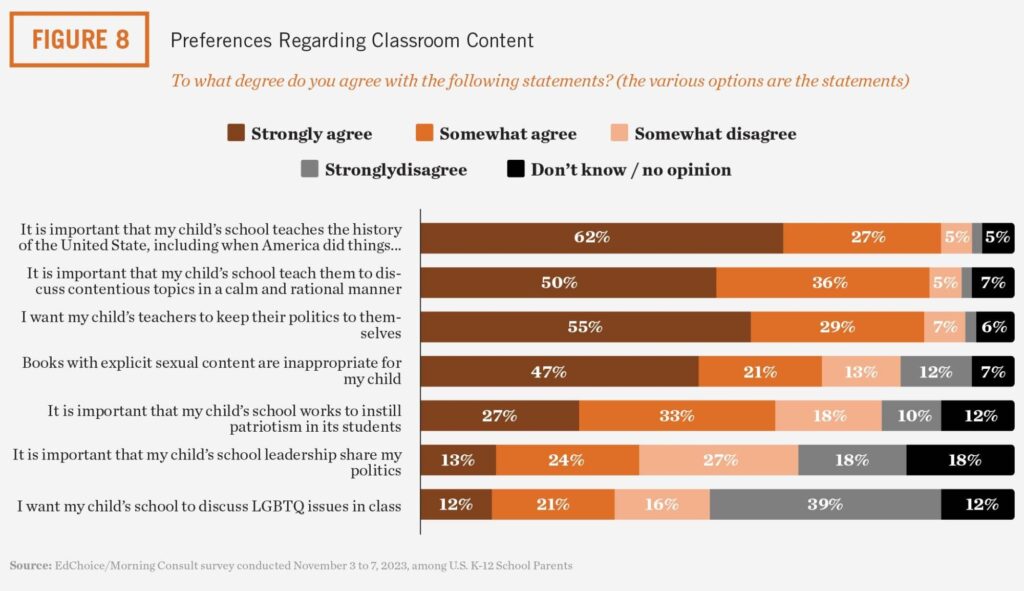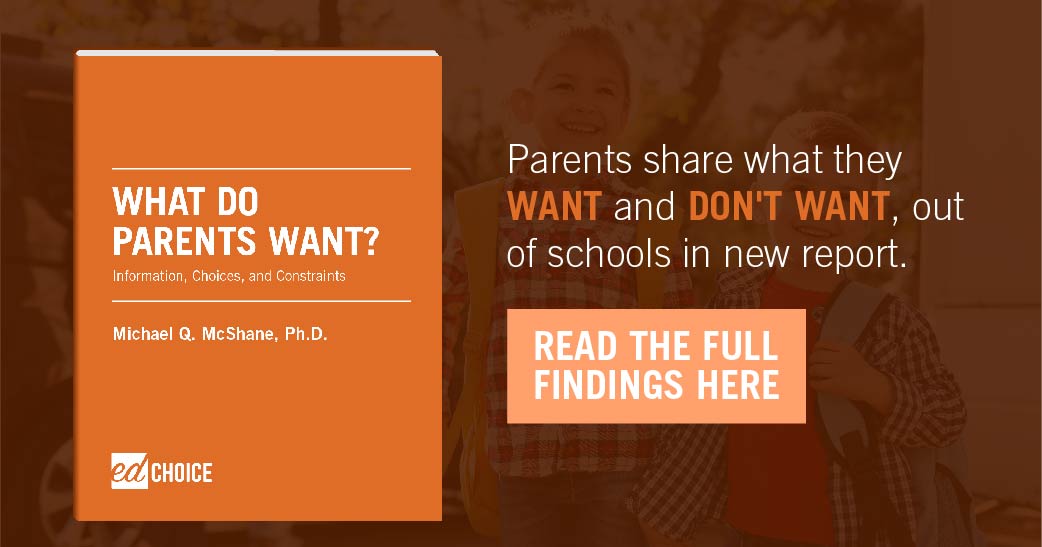Revealing Trends: New Study Sheds Light on Parental Preferences
As more and more states create evermore school choice programs, more parents will have the opportunity to choose schools that reflect their preferences. That has serious implications across multiple dimensions. It has implications for: the information that parents will want and need when they make their choices; for school leaders looking to create attractive environments; and for policymakers looking to create the supportive policies around transportation and the like to help facilitate school choices. So, what are those preferences?
In partnership with the research firm Morning Consult, we asked a nationally representative group of American parents a battery of questions ranging from where they get their information about school performance to what they would like to see their child’s school emphasize in the classroom. Today, we released the results of that survey in a new report titled: What Do Parents Want? Information, Choices, and Constraints.
There is a great deal of data in the report, but several few key findings are worth highlighting:
- When evaluating a potential school, parents’ top choices for information were graduation rates, state report cards, class sizes, and test scores.
- Parents overwhelmingly want teachers to keep their politics to themselves. Eighty-four percent of parents agreed “a lot” or “somewhat” with the statement, “I want my child’s teacher to keep their politics to themselves.”
- Parents are reticent to send their child to a school that takes political stances in conflict with their own. Fifty-six percent of surveyed parents told us that they would not choose a school that took political stances with which they disagreed, even if that school was of high academic quality.
- Parents are willing to choose schools that are farther away. When asked about driving time, more than half of parents said they would drive an additional 20 minutes or more to get their child to a higher quality school. When asked if they would choose a school that was higher quality but required their child to spend 30 additional minutes on a bus, 68% of parents said they would still choose that school.
- Parents appear to prefer schools that use more technology than less; that emphasize STEM over the humanities; that have stricter versus more lenient discipline; and that emphasize national pride over skeptical treatment of American history.
- Parents say they want schools to teach the fullness of American history, both positive and negative; to instill the ability to discuss contentious issues rationally; and to avoid both sexually explicit material and LGBTQ content in the classroom.
Let’s take a moment to unpack some of the findings around politics. Anyone who has been even tangentially following education in the past few years has seen skirmishes at school board meetings, new advocacy groups emerge to challenge the perceived political orientation of schools, and a flurry of legislative efforts to intervene in schools taking political positions.
At a basic level, parental preferences are pretty straightforward on this front. As mentioned in the second bullet point above, a massive majority of parents told us that they wanted their child’s teacher to keep his or her politics to himself or herself. And, they told us that even if a school had a great academic reputation, if it took political positions at odds with their own, 56% of parents would not send their child there. On the other side of the coin, only 37% of parents told us that it was important that their child’s school shared their politics. It appears that parents don’t mind if their child’s school doesn’t share their politics, as long as the school doesn’t make a big deal about it.

Parents also appear to be in agreement on multiple issues that have been painted as polarizing or divisive in recent months and years. Eighty-nine percent of parents agreed that schools should teach the full history of the United States, including when America did things that were wrong. Eighty-six percent of parents agreed that schools should teach students to discuss contentious topics in a calm and rational manner.
While not as overwhelming, 68% of parents said that books with sexually explicit content were inappropriate for their child, and 60% said that they wanted their child’s school to work to instill patriotism in its students. Fifty-five percent of parents indicated that they did not want their child’s school to discuss LGBTQ issues in class.
There were other interesting nuggets in there. For example, 38% of parents said that they would send their child to a religious school of a denomination that they did not belong to. Whether that number is small or large is in the eye of the beholder. Sixty-two percent of parents said that they were open to a school that was operating in its first year. Seventy-nine percent of parents would send their child to a school that had a strong academic reputation even if it meant that their child would be a racial or ethnic minority in that school.
We’ll be publishing follow-up analyses here on the EdChoice blog digging into some of the demographic breakouts to see if different groups of parents responded differently. But until then, enjoy the new report. Hopefully it can meaningfully add to what we know about the thorny question of what parents want.





